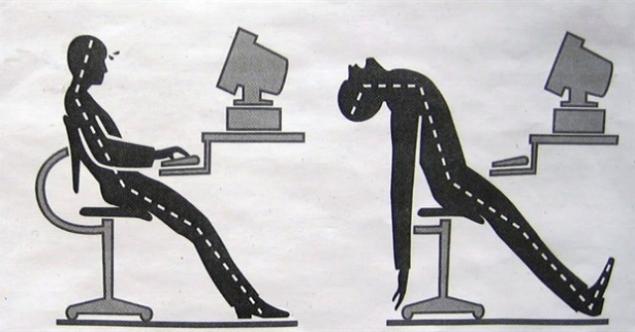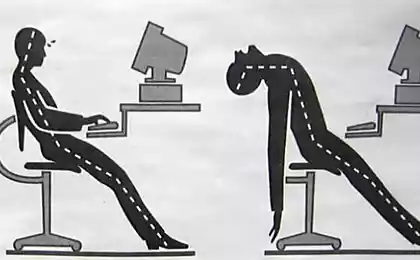590
Blogger David Cain on personal effectiveness - "Your lifestyle has already created"!!!
Blogger David Cain shared an interesting thought about the effectiveness of the work schedule, contemporary society, consumption and other relevant issues. Here is a translation of his article "Your lifestyle has already created" (Your Lifestyle Has Already Been Designed).

"Well, here I am again in the working world. Found a well-paid job in the engineering industry, and life finally returns to normal after nine months of travel.
Because I used a completely different way of life, the sudden change to the schedule from 9 to 17 got me thinking about things that before I overlooked.
Since I was offered a job, I became much relaxed to deal with your money. Not mindlessly, but a little wasteful. For example, again, buy expensive coffees.
We are not talking about big, extravagant purchases. I'm talking about small, random, and uncontrolled spending on things that actually not so important in my life.
Looking back, I think I always did it when well earned. But nine months I was travelling, mountaineering and led a very different lifestyle, without income.
I believe the additional cost is dictated by my own sense of growth. I again highly paid professional, that sort of entitles me to a certain level of extravagance. There is a curious feeling of power when you lay out a few twenty dollar bills, bypassing critical thinking. It's nice to use the power of the dollar when you know that pretty soon waste will be restored.
That I do, there is nothing unusual. It seems that everyone else is doing the same thing. I just returned to the normal consumer mentality after spending some time away from him.
One of the most amazing discoveries that I've made in my travels, is that when traveling abroad, I spent much less per month (including countries more expensive than Canada) than when he was home and constantly working. I had much more free time, I visited the most beautiful places in the world, constantly meeting new people, nothing to worried, unforgettable time and all it cost me less money than my simple life in the chart from 9 to 17 in one of the least expensive cities in Canada.
It seems that the money I received so much more when traveling. But why?
The formation of culture of consumption of unnecessary goods or services
Here in the West, big business is deliberately cultivated a lifestyle that focuses on unnecessary expenses. Companies of all industries have played an important role in raising society to careless handling of money. They encourage the habit of wasting money accidentally or without important need.
In the documentary "the Corporation" marketing psychologist discussed one of the methods she used to increase sales. Its staff investigated how effectively children's nagging increases the likelihood that parents will buy the coveted toy. They found that 20% to 40% of the toys would remain in the shop, if the child is not harassed parents whims. The same would not have been one of four visits to the theme Park. The results of the study were used to sell products directly to children, spurring them on to begging my parents for buy.
Only one marketing campaign alone led to the fact that buyers parted with millions of dollars because of induced demand.
"You can manipulate customers, to make them want – and therefore to buy your products". Lucy Hughes, one of the creators of "The Nag Factor".
This is just one small example of what's going on for a very long time. Large companies raise millions that are sincerely praising the advantages of the products, and that create a culture of hundreds of millions of people who buy much more than they need, and money trying to dispel the dissatisfaction with life.
We buy things to cheer yourself to the Joneses to make their children's ideas about their future adult life, to show the world your status and many other psychological reasons that have very little to do with the actual usefulness of the product. How many things do you have in your basement or garage that you didn't use last year?
The real reason for the forty-hour week
To maintain a culture of this kind, large company established the 40-hour workweek as a norm. Under such circumstances, workers are forced to make a life in the evenings and at weekends. It disposes us to spend more on entertainment and convenience, since there is no free time.
I went back to work only a few days ago, and noticed how many useful things have disappeared from my life: Hiking, exercise, reading, meditating, and extra writing.
All of these classes have one thing in common: they're free or require a small cost, however, they require time.
Suddenly I had much more money and much less time. This means that I have become the typical working North American, which was not the case a few months ago. While I was abroad, I have not visited so often thought about spending, I was walking through the national Park or spend hours reading a book on the beach. Now such things cannot be and speeches, after all this activity it is possible to lose a precious day off!
The last thing I want coming home to do the exercises. It's the last thing I want to do after dinner or before bedtime or immediately after waking up. And so each weekday.
It is obvious that this problem has a simple solution: work less to have more free time.
I was already convinced that I can live a full life with less income than I have now. Unfortunately, in my industry and most others is almost impossible. You either work 40 hours or not working at all. My clients and contractors adhere to the standard work schedule, so I can't ask them not to ask me anything after 13:00.
The eight-hour day was developed in the 19th century during the industrial revolution in England. Before factory workers exploited for 14-16 hours a day.
With the advanced technology and methods workers in all industries became able to produce much more work in a short period of time. It would be logical to expect that this will lead to the shortening of the workday.
But the 8-hour working day brings too much benefit to big business. The benefit is not that during this time people are doing the vast bulk of cases – the average office employee over the 8 hours doing three hours of real work. But an acute shortage of free time leads people to the fact that they are more willing to pay for convenience, pleasure and any joy. This keeps them from TV advertising. This deprives ambitions after hours.
We came to the culture that has developed to keep us in a state of fatigue, hunger, a willingness to indulge their desire to pay a lot for convenience and entertainment. And most importantly – remains vague dissatisfaction with his life, so we want what you have. We buy so much because it always seems that something else is not enough.
Western countries, especially the United States, built with the expectation of satisfaction of desires, addictive and unnecessary costs. We spend money to lift your mood, to reward yourself, to celebrate, to solve problems, to raise its status, to dispel boredom.
Can you imagine what would have happened if all of America stopped buying so many unnecessary things that do not bring significant and lasting benefits into our lives?
The economy would have collapsed and would never have recovered.
All the widespread problems of America, including obesity, depression, pollution and corruption – this is the price paid for creating and maintaining the economy of a trillion dollars. The economy was "healthy", America has to remain unhealthy.
Healthy, happy people don't feel they need much of what they have yet.
This means that they do not buy so much stuff, so much fun and they not looking at the commercials.
Culture eight-hour working day is the most powerful tool of big business to keep people in this state, when the answer to all problems is to buy something.
You may have heard about Parkinson's law: "Work fills the time allotted to it". In twenty minutes you can do surprisingly a lot. But only when you have to perform the action is only twenty minutes. If you have all day, then most likely it will take more time.
Most of us have so little respect for their money. The more we earn, the more you spend. It is not because we suddenly have to buy more. We spend more because we can afford it. In fact, people find it difficult to avoid the growth of standard of living (or at least curb the level of expenditure), when there is increase in income.
I don't think I need to hide from the ugly system, to live in the forest and pretend to be deaf as proposed by the symbol of non-conformism, Holden Caulfield. But it is useful for us to understand what we want to see a major Corporation. They worked for decades to create millions of ideal consumers, and they succeeded. If you are not a real anomaly, your lifestyle has long planned.
Ideal customer is constantly unhappy, but full of hope, not interested in a serious personal development, are very attached to the TV, works full time, making good money, indulge yourself in your free time and just goes with the flow.
Remind you of anyone?
Two weeks ago I would have said it's definitely not about me. But if all my weeks were similar to the past seven days, the answer would be self-delusion".published
Author: David Kane
P. S. And remember, only by changing their consumption — together we change the world! © Join us at Facebook , Vkontakte, Odnoklassniki
Source: cameralabs.org/9315-kto-pridumal-vash-obraz-zhizni-i-kakova-realnaya-prichina-sorokachasovoj-rabochej-nedeli

"Well, here I am again in the working world. Found a well-paid job in the engineering industry, and life finally returns to normal after nine months of travel.
Because I used a completely different way of life, the sudden change to the schedule from 9 to 17 got me thinking about things that before I overlooked.
Since I was offered a job, I became much relaxed to deal with your money. Not mindlessly, but a little wasteful. For example, again, buy expensive coffees.
We are not talking about big, extravagant purchases. I'm talking about small, random, and uncontrolled spending on things that actually not so important in my life.
Looking back, I think I always did it when well earned. But nine months I was travelling, mountaineering and led a very different lifestyle, without income.
I believe the additional cost is dictated by my own sense of growth. I again highly paid professional, that sort of entitles me to a certain level of extravagance. There is a curious feeling of power when you lay out a few twenty dollar bills, bypassing critical thinking. It's nice to use the power of the dollar when you know that pretty soon waste will be restored.
That I do, there is nothing unusual. It seems that everyone else is doing the same thing. I just returned to the normal consumer mentality after spending some time away from him.
One of the most amazing discoveries that I've made in my travels, is that when traveling abroad, I spent much less per month (including countries more expensive than Canada) than when he was home and constantly working. I had much more free time, I visited the most beautiful places in the world, constantly meeting new people, nothing to worried, unforgettable time and all it cost me less money than my simple life in the chart from 9 to 17 in one of the least expensive cities in Canada.
It seems that the money I received so much more when traveling. But why?
The formation of culture of consumption of unnecessary goods or services
Here in the West, big business is deliberately cultivated a lifestyle that focuses on unnecessary expenses. Companies of all industries have played an important role in raising society to careless handling of money. They encourage the habit of wasting money accidentally or without important need.
In the documentary "the Corporation" marketing psychologist discussed one of the methods she used to increase sales. Its staff investigated how effectively children's nagging increases the likelihood that parents will buy the coveted toy. They found that 20% to 40% of the toys would remain in the shop, if the child is not harassed parents whims. The same would not have been one of four visits to the theme Park. The results of the study were used to sell products directly to children, spurring them on to begging my parents for buy.
Only one marketing campaign alone led to the fact that buyers parted with millions of dollars because of induced demand.
"You can manipulate customers, to make them want – and therefore to buy your products". Lucy Hughes, one of the creators of "The Nag Factor".
This is just one small example of what's going on for a very long time. Large companies raise millions that are sincerely praising the advantages of the products, and that create a culture of hundreds of millions of people who buy much more than they need, and money trying to dispel the dissatisfaction with life.
We buy things to cheer yourself to the Joneses to make their children's ideas about their future adult life, to show the world your status and many other psychological reasons that have very little to do with the actual usefulness of the product. How many things do you have in your basement or garage that you didn't use last year?
The real reason for the forty-hour week
To maintain a culture of this kind, large company established the 40-hour workweek as a norm. Under such circumstances, workers are forced to make a life in the evenings and at weekends. It disposes us to spend more on entertainment and convenience, since there is no free time.
I went back to work only a few days ago, and noticed how many useful things have disappeared from my life: Hiking, exercise, reading, meditating, and extra writing.
All of these classes have one thing in common: they're free or require a small cost, however, they require time.
Suddenly I had much more money and much less time. This means that I have become the typical working North American, which was not the case a few months ago. While I was abroad, I have not visited so often thought about spending, I was walking through the national Park or spend hours reading a book on the beach. Now such things cannot be and speeches, after all this activity it is possible to lose a precious day off!
The last thing I want coming home to do the exercises. It's the last thing I want to do after dinner or before bedtime or immediately after waking up. And so each weekday.
It is obvious that this problem has a simple solution: work less to have more free time.
I was already convinced that I can live a full life with less income than I have now. Unfortunately, in my industry and most others is almost impossible. You either work 40 hours or not working at all. My clients and contractors adhere to the standard work schedule, so I can't ask them not to ask me anything after 13:00.
The eight-hour day was developed in the 19th century during the industrial revolution in England. Before factory workers exploited for 14-16 hours a day.
With the advanced technology and methods workers in all industries became able to produce much more work in a short period of time. It would be logical to expect that this will lead to the shortening of the workday.
But the 8-hour working day brings too much benefit to big business. The benefit is not that during this time people are doing the vast bulk of cases – the average office employee over the 8 hours doing three hours of real work. But an acute shortage of free time leads people to the fact that they are more willing to pay for convenience, pleasure and any joy. This keeps them from TV advertising. This deprives ambitions after hours.
We came to the culture that has developed to keep us in a state of fatigue, hunger, a willingness to indulge their desire to pay a lot for convenience and entertainment. And most importantly – remains vague dissatisfaction with his life, so we want what you have. We buy so much because it always seems that something else is not enough.
Western countries, especially the United States, built with the expectation of satisfaction of desires, addictive and unnecessary costs. We spend money to lift your mood, to reward yourself, to celebrate, to solve problems, to raise its status, to dispel boredom.
Can you imagine what would have happened if all of America stopped buying so many unnecessary things that do not bring significant and lasting benefits into our lives?
The economy would have collapsed and would never have recovered.
All the widespread problems of America, including obesity, depression, pollution and corruption – this is the price paid for creating and maintaining the economy of a trillion dollars. The economy was "healthy", America has to remain unhealthy.
Healthy, happy people don't feel they need much of what they have yet.
This means that they do not buy so much stuff, so much fun and they not looking at the commercials.
Culture eight-hour working day is the most powerful tool of big business to keep people in this state, when the answer to all problems is to buy something.
You may have heard about Parkinson's law: "Work fills the time allotted to it". In twenty minutes you can do surprisingly a lot. But only when you have to perform the action is only twenty minutes. If you have all day, then most likely it will take more time.
Most of us have so little respect for their money. The more we earn, the more you spend. It is not because we suddenly have to buy more. We spend more because we can afford it. In fact, people find it difficult to avoid the growth of standard of living (or at least curb the level of expenditure), when there is increase in income.
I don't think I need to hide from the ugly system, to live in the forest and pretend to be deaf as proposed by the symbol of non-conformism, Holden Caulfield. But it is useful for us to understand what we want to see a major Corporation. They worked for decades to create millions of ideal consumers, and they succeeded. If you are not a real anomaly, your lifestyle has long planned.
Ideal customer is constantly unhappy, but full of hope, not interested in a serious personal development, are very attached to the TV, works full time, making good money, indulge yourself in your free time and just goes with the flow.
Remind you of anyone?
Two weeks ago I would have said it's definitely not about me. But if all my weeks were similar to the past seven days, the answer would be self-delusion".published
Author: David Kane
P. S. And remember, only by changing their consumption — together we change the world! © Join us at Facebook , Vkontakte, Odnoklassniki
Source: cameralabs.org/9315-kto-pridumal-vash-obraz-zhizni-i-kakova-realnaya-prichina-sorokachasovoj-rabochej-nedeli























